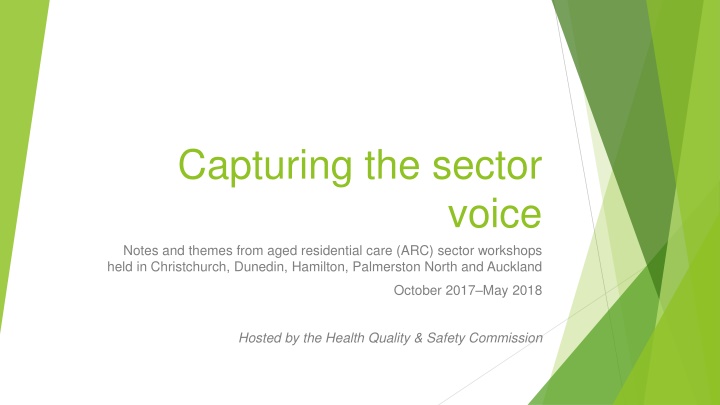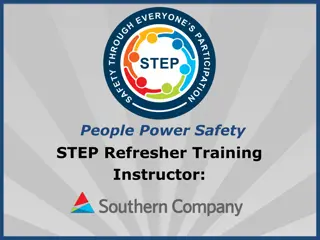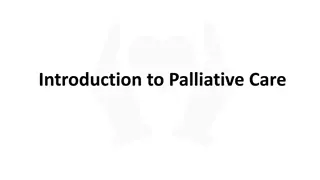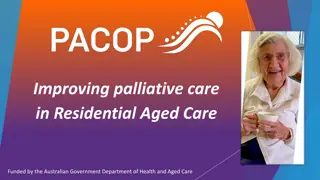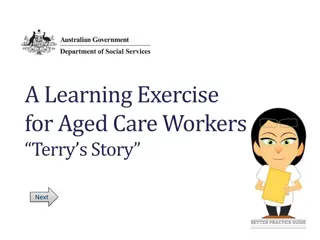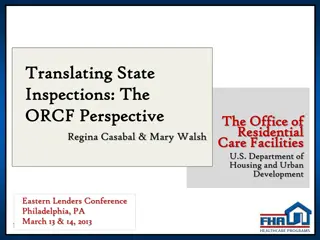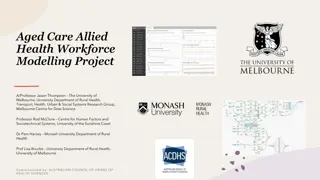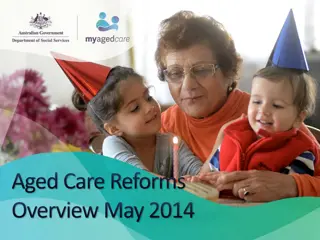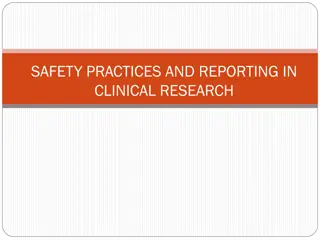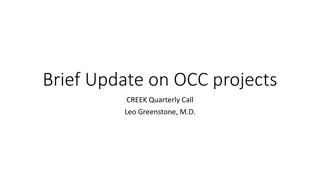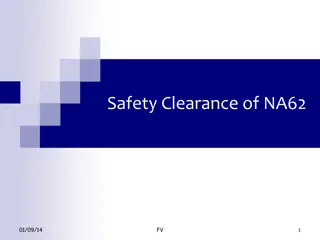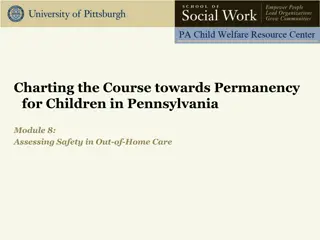Enhancing Quality and Safety in Aged Residential Care
Workshop insights from ARC sector workshops highlight the importance of resident and family-centric care, improving shared learning, enhancing staff competency, and promoting leadership and teamwork. Key themes include communication, staff recognition, education, adverse event review, and leadership development strategies to elevate the quality of care in aged residential facilities.
Download Presentation

Please find below an Image/Link to download the presentation.
The content on the website is provided AS IS for your information and personal use only. It may not be sold, licensed, or shared on other websites without obtaining consent from the author.If you encounter any issues during the download, it is possible that the publisher has removed the file from their server.
You are allowed to download the files provided on this website for personal or commercial use, subject to the condition that they are used lawfully. All files are the property of their respective owners.
The content on the website is provided AS IS for your information and personal use only. It may not be sold, licensed, or shared on other websites without obtaining consent from the author.
E N D
Presentation Transcript
Capturing the sector voice Notes and themes from aged residential care (ARC) sector workshops held in Christchurch, Dunedin, Hamilton, Palmerston North and Auckland October 2017 May 2018 Hosted by the Health Quality & Safety Commission
Resident and family-centred care Improve quality and safety culture Remember the why we are guests in the resident s home. Integrating communication Listening to residents and staff experience Multidisciplinary team recognition and coordinated treatment of acute and subtle deterioration. Focus on improvement Respect staff experiences and share them. Minimise restraints: promote resident dignity through education and support resources. Improve communication between management and staff and with families. Establish forums so housekeeping, nursing, health care assistants, kitchen staff etc identify their own quality goals to work on. Improve trust establish formal ways of sharing. Use champions to focus specific issues: eg, palliative care, falls. Toolbox for handovers specific to conditions, diseases, drugs. Develop better resources for sharing stories: blogs, videos, social media, Zoom conferences etc. Enhancing nutrition: enrich food presentation, taste and quality. Break down professional barriers between care givers, registered nurses and enrolled nurses. Staff recognition process. Wellness initiatives for staff. Provide for registered nurse study leave. Improve links between interRAI assessments and care planning.
Improve shared learning Promoting staff competency Better retention policies to address high staff turnover. Education to improve resident care Learning from experience Training to meet need through different platforms ie, forums, online, mentors, supervision etc. Staff education and training core competencies: dementia care communication resident centred care frailty and recognising and treating deterioration palliative care. Establish a systematic approach to adverse events review using root cause analysis and appropriate tools; work-up recommendations and improvement with the staff, monitor progress/actions. More leadership development. Structured curriculum for aged residential care clinical staff. Involve registered nurses in clinical discussions. Setting education standards at a local and national level. Promote a learning culture: toolbox talks & resources policies to promote clinical application of new knowledge assessing education effectiveness in practice. Promote staff to make them feel more valued; increase staff profiles with other clinicians. Yearly incentives for personal development plan completion. Promote a No blame culture. Enhanced orientation for new staff.
Leadership and teamwork Recognising great work ARC leadership development Develop career pathways. Reward system for staff doing a good job and for emerging leaders. Make it positively framed to improve culture. Fostering teamwork Enhance training at registered nurse and clinical manager levels. Restructure staff meetings to be more quality- focused. Supporting attendance to conferences and forums to support quality. More leadership training. Identify champions to develop skills and promote shared learnings to improve staff accountability and involvement. Legislate to specify training/education for ARC managers. Pay parity for registered nurses in ARC, same as in district health boards. Development of strong network groups. There should be cross-pollination of ideas. Develop a standard orientation pack for incoming facility managers so there is consistency across the sector, allowing for organisational customization. Clear leadership promotion avenues. Open the doors to dispel the myths around ARC- include schools, religious groups, not- for-profits etc. Registered nurses mentoring and training for new nursing recruits.
Measurement for quality improvement Translating data into practice Integration of electronic systems and quality measurement Pictorial and visual tools eg, barometers. Staff surveys. Integration of computerised systems. Identify the real needs of each resident. Database for all accidents, incidents, hazards etc. Measure diversity. Systematic approach to support standardisation of documentation and availability of best practice and evidence-based resources. Enhanced reporting from electronic systems. Electronic support for prompt response to resident care needs eg, bell system to ensure call bells can be tracked and recorded. Enhance the system and use of data from user satisfaction surveys, complaints, adverse events, family feedback to support quality work. Electronic prescribing system for all. Translating InterRAI data into care plans.
